Related Research Articles

Paul Abraham Dukas was a French composer, critic, scholar and teacher. A studious man of retiring personality, he was intensely self-critical, having abandoned and destroyed many of his compositions. His best-known work is the orchestral piece The Sorcerer's Apprentice, the fame of which has eclipsed that of his other surviving works. Among these are the opera Ariane et Barbe-bleue, his Symphony in C and Piano Sonata in E-flat minor, the Variations, Interlude and Finale on a Theme by Rameau, and a ballet, La Péri.
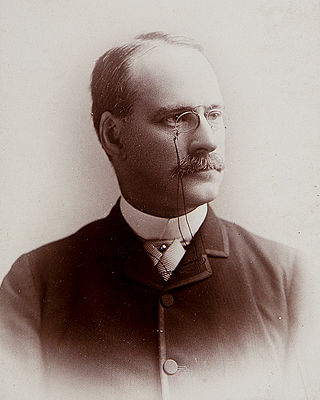
William Collins Whitney was an American political leader and financier and a prominent descendant of the John Whitney family. He served as Secretary of the Navy in the first administration of President Grover Cleveland from 1885 through 1889. A conservative reformer, he was considered a Bourbon Democrat.

Randall Thompson was an American composer, particularly noted for his choral works.

Walter Henry Passmore was an English singer and actor best known as the first successor to George Grossmith in the comic baritone roles in Gilbert and Sullivan operas with the D'Oyly Carte Opera Company.
The National Federation of Music Clubs (NFMC) is an American non-profit philanthropic music organization that promotes American music, performers, and composers. NFMC endeavors to strengthen quality music education by supporting "high standards of musical creativity and performance." NFMC headquarters are located in Greenwood, Indiana. Since its founding in 1898, the NFMC has grown into one of the world’s largest music organizations with club and individual members of all ages. The NFMC is chartered by the Congress of the United States, and is the only music organization member of the United Nations.
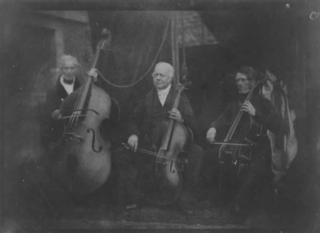
Charles Lucas was an English composer, cellist, conductor, publisher and from 1859 to 1866 third principal of the Royal Academy of Music.

John Coates was a leading English tenor, who sang in opera and oratorio and on the concert platform. His repertoire ranged from Bach and Purcell to contemporary works, and embraced the major heldentenor roles in Richard Wagner's operas. For more than 40 years, with only a four-year interruption for military service during World War I, he overcame the limitations of a voice that was not naturally large by impressing listeners with his intense artistic expression, lively diction, musical versatility and memorable stage presence.
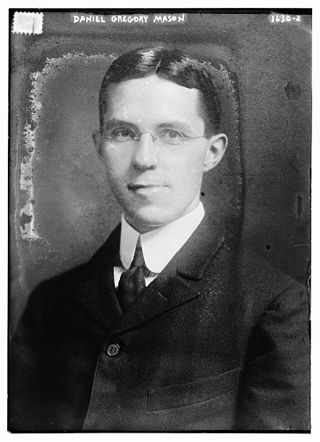
Daniel Gregory Mason was an American composer and music critic.

The Kneisel Quartet was a string quartet founded in 1885 by violinist Franz Kneisel, then concertmaster of the Boston Symphony Orchestra. It continued to perform until 1917, and was generally considered the leading string quartet of its time in the United States.

Cram and Ferguson Architects is an architecture firm based in Concord, Massachusetts. The company was founded as a partnership in 1889 by the "preeminent American Ecclesiastical Gothicist" Ralph Adams Cram and Charles Francis Wentworth. In 1890 they were joined by Bertram Goodhue, who was made a partner in 1895.
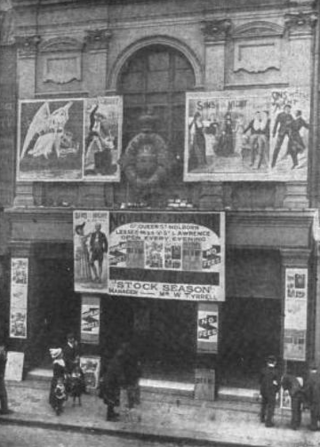
The Novelty Theatre was a London theatre. It opened in 1882 in Great Queen Street and was accessed off Little Queen Street until 1905, and from the new Kingsway road from 1905 onwards. It hosted the London premiere of A Doll's House in 1889. The theatre closed in 1941 and was demolished in 1959.

George G. Adams was an American architect from Lawrence, Massachusetts.

Amélie Heussner Nikisch was a Belgian soprano, actress, voice teacher, and composer.
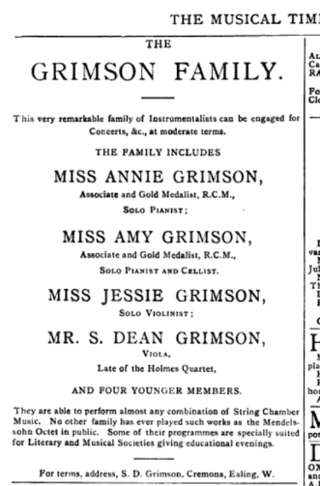
The Grimson family was a family of classical musicians active in London from the early 1870s.
References
- ↑ Surette, Thomas Whitney - By Charles W. Heffernan American National Biography
- ↑ Kathleen Uhler Adams & Dorothea Bowditch Jones: Thomas Whitney Surette: a crusader for good music, Cambridge, MA: Windflower Press 1983, S. 102.
- 1 2 "Surette, Thomas Whitney." Baker’s Biographical Dictionary of Musicians. Encyclopedia.com. 26 Aug. 2018
- ↑ Kathleen Uhler Adams & Dorothea Bowditch Jones: Thomas Whitney Surette: a crusader for good music, Cambridge, MA: Windflower Press 1983, S. 22.